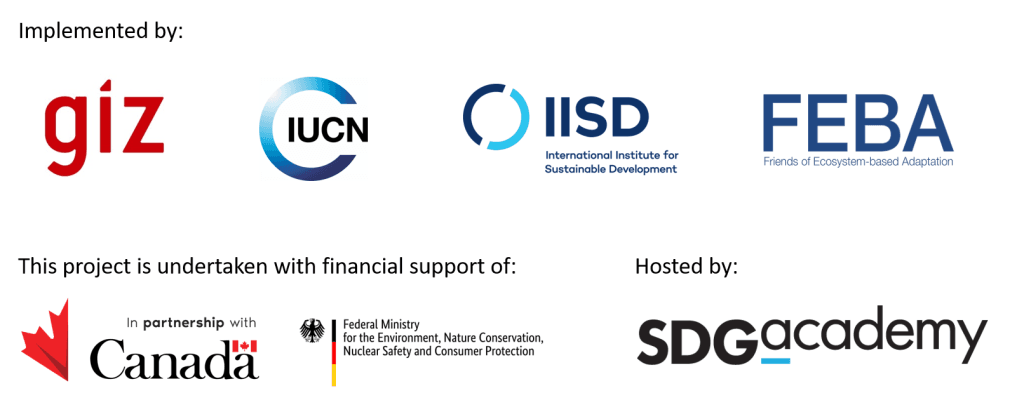EbA E-learning Course
Overview
Ecosystem-based Adaptation is increasingly gaining policy support and being implemented by diverse actors around the world. EbA has broad applications across diverse sectors in fostering sustainable development and can help achieve multiple benefits for nature and human well-being.
While EbA guidebooks, case studies and principles have contributed toward standardising the EbA approach, there is a clear need for further training opportunities to strengthen EbA implementation across diverse sectors while ensuring rights-based approaches, gender equity and better outcomes for biodiversity and ecosystems are achieved. This EbA e-learning course, developed by partners IUCN, GIZ, and IISD for a global audience, will equip learners with transferable and replicable skills in designing and implementing EbA initiatives by offering targeted training on key principles, risk assessments, monitoring, and governance.
Offered as a massive open online course (MOOC), the key aim of the course is to increase EbA knowledge and uptake outside of the environmental conservation community and help participants integrate EbA into other sectors, including water, agriculture and in urban environments.
Members of the FEBA network provided valuable feedback and review on early versions of the course.
Course format
This self-paced e-learning course consists of nine units comprised of video lectures and case studies, quizzes, and handouts. The course will take approximately 10 hours to complete and can be completed at the convenience of the learner. Units 2-7 will each have a quiz to assess the achievement of the respective unit’s learning objectives. Handouts that summarise the unit’s content and contain additional resources on the topics discussed are also provided with each unit.
At this time, the course is offered in English, French & Spanish.
Learning objectives
By the end of the course, participants will:
- understand the role of EbA within an overall climate change adaptation strategy;
- be able to plan EbA activities in a logical order and apply EbA best practices;
- consider and integrate social aspects, such as gender, livelihoods, and local and Indigenous knowledge, into EbA projects; and
- learn how to mainstream EbA across sectors.
Course outline
- Unit 1 – Introduction to the Course
- Unit 2 – What is EbA?
- Unit 3 – The EbA Mainstreaming Framework
- Unit 4 – Climate Risk Assessment
- Unit 5 – EbA Valuation
- Unit 6 – Implementing EbA
- Unit 7 – Monitoring, Evaluation and Learning
- Unit 8 – Mandatory Insight Modules
- Unit 9 – Optional Insight Modules
Target audience
The course targets decision-makers in public and private organisations, professionals who may not be familiar with EbA but who work in a related field (development, infrastructure, agriculture, integrated water resources management), civil society organizations, actors at community, national and global scales, early-career EbA professionals, current students and university faculty as well as climate practitioners. As the course provides a certain level of technical detail, interest in learning in-depth about planning and implementing EbA measures is a key requirement.

